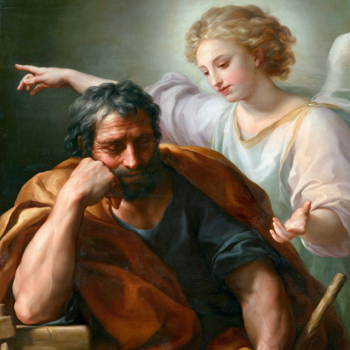
By: Ryan Kerr, C.S.C. on December 23rd, 2020
Joseph, Dreams, and the Heart’s Desire
Holy lives of inspiration | Seasonal Reflections
As we look to these last days of Advent, this season of preparation and hope for Christ’s coming, let’s take a moment to consider what we are hoping for and how we put into action a renewed life with Christ. Amid the noise and the spirit of the Christmas season, an easy temptation is to let the Incarnation of Jesus be an abstract and distant nicety.
What does it actually mean to live our lives with Christ? I’d like us to go to Saint Joseph as a good model for concrete and practical openness and engagement with Jesus.
This silent, simple man is a sentinel in constant watching and waiting for the goodness of God to come into his life. Joseph’s example can help us cut clear to the heart of the life of faith: responding to God as the fulfillment of our heart’s desire.
While Joseph never speaks a word in the Gospels, we learn much of his heart and the way he attends to its longings through his dreams in the Gospel of Matthew. Dreams are a place of mystery and desire. Rarely are they as clear as Joseph’s, yet they are imbued with the meaning and yearnings of our hearts.
In his first dream, an angel comes to Joseph and tells him that Jesus was conceived of the Holy Spirit and that He will save people from their sins. Now, while these dreams feature an angel from Heaven, they are both a revelation from God to Joseph and an expression of Joseph’s own desires (a gift from God as are all our good desires). Joseph was surely grateful for this news. First, because he is being made a part of the salvific story, the fulfillment of all his faith and a new seed coming through his family, the House of David. Second, Joseph's desire to protect Mary from disgrace is evidence that he had a real hope for a justice that provides salvation from sins rather than punishment or disregard for the sinner. So, Joseph, the just man, acts and takes Mary in.
There are three keys to take from this first dream:
- Take stock of the gifts of our life to be grateful for
- Recognize and express our desires
- Act on our good desires even when that may be challenging
 Joseph’s second dream is even more helpful for us at the advent of our spiritual discernment. An angel said to Joseph: “Get up! Take the Child and His Mother and flee to Egypt, and stay there until I tell you.” Joseph went to Egypt. He was called there and was waiting with a purpose, waiting for the next call, all the while being faithful to protecting Jesus from Herod, faithful to his commitments as a husband and foster-father.
Joseph’s second dream is even more helpful for us at the advent of our spiritual discernment. An angel said to Joseph: “Get up! Take the Child and His Mother and flee to Egypt, and stay there until I tell you.” Joseph went to Egypt. He was called there and was waiting with a purpose, waiting for the next call, all the while being faithful to protecting Jesus from Herod, faithful to his commitments as a husband and foster-father.
This dream is less clearly a fulfillment of Joseph’s desires, but it involves them nonetheless. First, there is the obvious desire for the safety of his wife and Child. This of course involves his greater desire for justice and salvation because he is safeguarding Jesus for His role as Savior. Additionally, Joseph probably waited—as we so often do, especially in this time of pandemic—for a return to normalcy, a return to Israel, a return to a place he can call home. All the while, this period of waiting, in addition to leaving his home and family and nation, entailed the daily sacrifices of his labor in order to provide for and give himself in love to Mary and Jesus.
For the years that the Holy Family spent in Egypt, Joseph was surely waiting for the call, for his chance to return, to be where he really wanted to be. Imagine: he was probably continually wondering what could be a sign, what’s not a sign, and perhaps even faced his own share of doubts as to why he was there and if he was really doing the right thing—forcing him to rely on the memory of the original grace of the angel’s good news that Jesus will save people from their sins. He had to trust in a process that is surely difficult.
Joseph was in a place of discernment that I think many parents can relate to: he was living his vocation, raising his child, and, while this was his desire, it still isn’t easy or happy all the time. What is he supposed to do?
The Scriptures give us no sign of Joseph’s struggle or doubts even though they surely were there. Instead, Scripture gives us the positive, powerful reality of Joseph’s faithfulness. The context for Joseph’s discernment as he waited for whatever his next step would be was to remember the graces, be committed to his daily tasks, and to give of himself. These provide three good questions of the stage of discernment which is less searching for something new and more living in the present moment:
- What am I grateful for?
- What am I committed to?
- How do I give of myself to those commitments?
This is the task of a lifetime. The most difficult reality of daily faithfulness is the struggle of letting our desires grow. How do our desires come to fulfillment when we are staying in the same place? We want our big dreams to lead to momentous journeys; however, for most of our lives, the greatest journey we can embark on is loving the gift of our life and sharing it in love with those around us. The life of spiritual discernment involves the concrete, daily work of pouring out the greatest love of our hearts in the smallest and simplest of tasks.
Through the intercession of St. Joseph, may we use this Advent and Christmas to deepen our faith in God’s action in our lives, respond to the call of our hearts and renew our hope that God will make our love and sacrifices fruitful.
Saint Joseph, pray for us!
-
Editor’s Note: We are grateful to Congregation of Holy Cross seminarian Ryan Kerr for offering his reflections on Saint Joseph as we enter into this year (December 8, 2020 – December 8, 2021) dedicated the Foster-Father of Jesus and Patron of the Universal Church.
- Visit our new Advent page, The Power of One "Yes" to God, offering resources throughout Advent to accompany families on their journey to Bethlehem and the celebration of Christmas.
